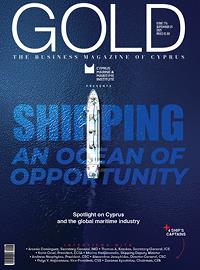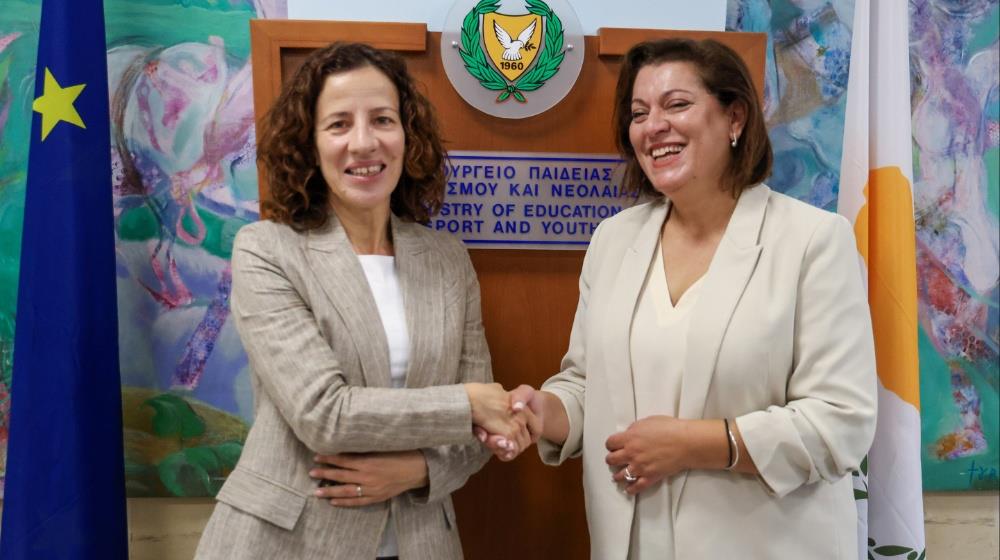The important role that the Cyprus Presidency of the Council of the EU can play in promoting education and skills in Europe has been highlighted by Roxana Mînzatu, Executive Vice-President of the European Commission and Commissioner for Social Rights and Skills, Quality Jobs and Preparedness.
She was speaking after a meeting with the Minister of Education, Sport and Youth, Athena Michaelidou, in Nicosia.
In statements after the 25 September meeting, the Minister said that they discussed the upcoming Cyprus Presidency of the Council of the EU. “We exchanged views on the holistic approach to skills and competences that we are promoting in education, giving priority to teachers and students,” she noted.
She added that they also discussed preparations for important initiatives, such as the informal meeting of Education Ministers to be held at the end of January, the conferences within the framework of the priorities of the Cyprus EU Presidency, which, as she said, are in line with the priorities of the European Commission, with an emphasis on technical and vocational education, as well as issues concerning the Erasmus program. “We stressed our desire for an inclusive and accessible program,” she said.
Athena Michaelidou mentioned that at noon, together with Mînzatu and the Minister of Labour and Social Insurance, Yiannis Panayiotou, they would visit the Pancyprian Gymnasium in Nicosia, where the Commissioner would have the opportunity to see firsthand and discuss with students their engagement with STEAM topics, “that is, their involvement with technology, mathematics, and the programs implemented by the school to familiarize children with skills and to foster skills development.”
For her part, the Commissioner referred to the role that the Cyprus EU Presidency can play in promoting skills and education in the EU. "On education and skills there is a number of urgent and hot topics and we aligned on what our work together will mean", she said.
She added that they focused on improving basic skills. "It’s not important just for Cyprus, it’s a challenge and also we need to work for a solution at the level of the European Union", she noted.
Mînzatu said that the Commission has launched the "Union of Skills" in March and an action plan for improving basic skills. "We work with member states and what we want is to use European funds" so that we are able to improve basic skills and employment, she said, adding that there will be a pilot program through Erasmus, in which Cyprus is going to participate. "But the Presidency itself needs to push forward the political commitment of all member-states to work towards better basic skills, because the competitiveness of our industry in EU, the strategic autonomy, that is so important, depends on the availability of well-equipped workers, well-equipped citizens", she stressed.
Regarding what the basic skills are, the Commissioner referred to a proposal that a "citizenship skill" is added in a set of basic skills. "Reading, literacy, mathematics, science, digital skills are important, but we need to have a foundational citizenship basic skill. We work with member-states so together we align towards this ambition and I think that with the Cypriot Presidency this will be also a priority," she noted.
She also referred to the Commission's ambition to have a more STEM-oriented skills programs. "STEM means technology, means engineering, means talent that is required for our competitiveness. It’s a challenge for many member-states. We want to have STEM targets so that we measure the ambition that we have in terms of how many graduates, how many students, pupils go towards STEM education pathways. This is an important ambition which we shared", she added.
Equally important, she said, is vocational training. "Next year we will present an action plan, a strategy on European vocational training. We need to increase the prestige, the attractiveness and the inclusiveness of vocational training. We need plumbers, electricians. We worked together two weeks ago in the Danish Presidency where we adopted the Declaration of Herning, where all member-states said “yes we need more and better, more attractive vocational training", the Commissioner highlighted.
The European Commission, through Erasmus and other programs that finance education, wants to improve the attractiveness of vocational training, Mînzatu continued, noting that "we want to prepare the vocational training European degree. We want VET (Vocational Education and Training) graduates as trainees in the European Commission. So we want to work on that as well."
Moreover, she noted that the Commission wants to work with the Cypriot Presidency on preparing European Teachers and Trainers Agenda. "For the first time on a European level, we want to join hands and see what measures we put forward to improve the working conditions, the attractiveness of the teaching career, which is essential for our success", she said.
Last, she said that they discussed with Minister Michaelidou the proposal for the next Multiannual Financial Framework. "We have a proposal for an increase in Erasmus, 50% more, from €26 billion to €41 billion. The allocation is strong, could be stronger, let’s see the negotiations, they will start during the Cypriot Presidency. We would be happy if the numbers go higher, but anyway we want to keep them high as well", she said, adding that there are also the allocations in the national plans, which require a minimum of 14% of social spending, which includes education investments as well.
"We are hopeful that during the Cypriot Presidency the negotiations on the budget for education will be essential. Thank you a lot for your partnership, we look forward in working together", she said addressing Michaelidou.
(Source: CNA)









